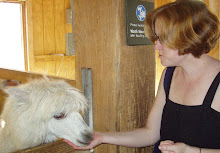Gathering and cataloguing knowledge is a relatively easy thing to do. We do it daily. We notice the people who are always at the bus stop at 8 AM and we've observed enough about them to feel we know who they are. We notice that the copy machine always seems to jam on the 4th and 5th copies if the paper drawer is too full. We take in all kinds of information, moment by moment. But how often do we act on that knowledge? How often do we apply the lessons learned to the next moment, the next challenge?
Our behavior patterns are so deeply ingrained in us that we hardly notice them. If we do notice the pattern, our efforts to change that pattern are often thwarted by our subconscious mind that tricks us back into our comfortable groove. For example, my need to be polite and liked by strangers is so strong that I once apologized to a man on the phone who called my place of business to request sexual services. I'm sorry, sir, we don't do that here. Any other New Yorker would have read this guy the riot act. Not me. After being mercilessly teased by my co-workers I vowed to be more assertive. Only a week later did a woman enter the store mumbling "gotta get a fix, gotta get a fix" and I kindly escorted her to the door while she, unsuccessfully, tried to pick my pocket.
The problem with applied knowledge is identifying the particular lesson. Were those lessons teaching me that people are scum that only want to take what they can get from me? Or was it about recognizing inappropriate and dangerous behavior? Probably the latter, but one could easily see how someone else would interpret the lesson as the former. Depending on the circumstances, of course. The all important circumstances.
In this profession, circumstances are everything. Circumstances hold the key to behavior and behavior is the key to the way the mind interprets information. Knowing a character means understanding how stimulus is interpreted through the character's filter of given circumstances. It is a mind numbing puzzle and the better written the character, the more daunting and tantalizing the actor's task. Bernarda Alba, in Lorca's play of the same name, could interpret her daughter's suicide as a sign that something is wrong in this house full of desperate women. However, the circumstances of her community, her religion and her upbringing will lead her to deny the dangers in her own home. And that is just the tip of the iceberg. To make Bernarda real is to take the textual clues to work backward and reconstruct her circumstances.
I once had a director who insisted on discussing each actor's choices regarding the given circumstances of the play. He called us in for half hour discussions about our characters. I found this unorthodox and slightly intrusive, but since I wanted to be polite I agreed. This was a big mistake. During the conversation he violently disagreed with me about a particular choice I made regarding a particular line of text. The line was "...and me, the near virgin!". I had constructed for myself a scenario that contributed to the character's confusion, however the director felt that I was not being historically accurate in my choice. Now, this choice did not show up anywhere else in the text or in the show. I can understand the director objecting to an actor who wanted to ride a Ferrari in a chariot race, but this was my private choice. Just something between the character and myself. It was a bridge that connected the two of us, and in one fell swoop this director and my own politeness burned that bridge. We argued because I felt he was being far too literal and general and that the choice I had made reflected my own experience and helped me to understand where she was coming from. I tried it his way, but it didn't make sense to my system. That is when I learned that some choices are private and should stay that way.
This, of course, makes teaching and learning acting extraordinarily difficult. After all, how many times in a career can an actor hear "Have the thought ON the line, not BEFORE it!", "Don't play the emotion!", or "Take two steps and THEN say the line." and be able to turn that into usable tools? I'm hungry for the personal play by play but I also recognize that it does not always serve the actor to share those things. You can make fun of the dead dog personalizations, but if they work who the hell is anyone to say boo about it?
It all boils down to confidence in your own experience. This is the circumstance one must cultivate in their real lives to make their stage lives full and truthful. However you go about that, my friends, is your own, private business.
Saturday, March 31, 2007
Subscribe to:
Post Comments (Atom)



No comments:
Post a Comment